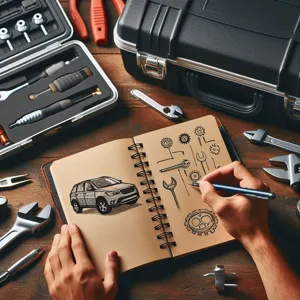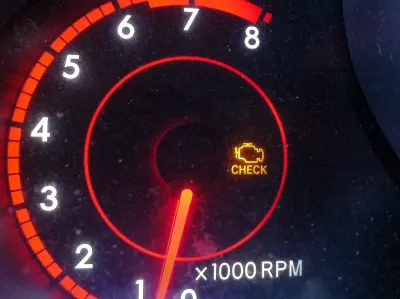Finding a reliable motorbike mechanic can feel like navigating a treacherous road with unexpected bumps and turns.
Whether you’re an avid rider or simply rely on your motorcycle for daily commuting, knowing that your bike is in the hands of a trustworthy professional is essential for both your safety and peace of mind. With countless workshops and mechanics vying for your business, it can be overwhelming to sift through the options and identify who you can truly depend on. In this blog post, we’ll explore ten essential tips that will guide you in your search for a dependable motorbike mechanic. From understanding the importance of credentials and reviews to recognizing the value of clear communication and fair pricing, these insights will arm you with the knowledge needed to make an informed decision and ensure your beloved ride receives the quality care it deserves. Get ready to hit the road with confidence, knowing you have a reliable expert by your side!
1. Understand the Importance of a Reliable Mechanic

When it comes to maintaining your motorbike, the quality of care it receives can significantly impact its performance, longevity, and your overall riding experience. Understanding the importance of a reliable mechanic is the first step in ensuring that your two-wheeled companion remains in top shape. A skilled mechanic doesn’t just fix problems as they arise; they are your partner in preventative maintenance and can help you avoid costly repairs down the line.
A reliable mechanic possesses a wealth of knowledge and expertise, allowing them to diagnose issues accurately and provide tailored solutions. This expertise extends beyond simple repairs; they should also be well-versed in the nuances of different motorbike brands and models. This specialized understanding is crucial, as even minor oversights can lead to significant mechanical failures or safety hazards.
Moreover, a trustworthy mechanic fosters a relationship built on transparency and communication. They should take the time to explain the issues your motorbike is facing, offer insights into necessary repairs, and provide honest assessments about what can wait and what needs immediate attention. This level of communication helps build your trust and confidence in their services.
In addition, a reliable mechanic will prioritize your safety. They understand that a well-maintained bike is not just a matter of performance but also a crucial factor in ensuring your safety on the road. By establishing a rapport with a dependable mechanic, you can rest easy knowing that your motorbike is in capable hands, allowing you to focus on what truly matters: the thrill of the ride. As you embark on your journey to find the right mechanic, keep this foundational importance at the forefront of your mind.
2. Ask for Recommendations from Fellow Riders
When it comes to finding a reliable motorbike mechanic, tapping into the knowledge of fellow riders can be one of your most valuable resources. The motorcycling community is tight-knit and often brimming with insights that can guide you to skilled and trustworthy mechanics. start by reaching out to friends, colleagues, or local riding clubs. Their firsthand experiences can provide you with an array of recommendations, especially if they’ve faced similar issues with their bikes.
Visit online forums and social media groups dedicated to motorcycling; these platforms can be goldmines for advice. You’ll find passionate riders eager to share their experiences with various mechanics, detailing not only their skills but also their customer service and pricing practices. Pay attention to recurring names or shops that consistently receive praise—this can be a strong indicator of reliability.
Additionally, don’t hesitate to ask for recommendations at local bike shops or dealerships. While they may have their mechanics on staff, they often know the best independent shops in the area. A mechanic who comes highly recommended by fellow riders is likely to have a good reputation in the community, offering you peace of mind when it comes to the care of your beloved bike. By gathering insights from those who share your passion for riding, you’re setting yourself up for a positive and trustworthy service experience.
3. Research Online Reviews and Ratings

In today’s digital age, online reviews and ratings are invaluable tools for anyone searching for a trustworthy motorbike mechanic. Before you hand over your beloved bike, take the time to delve into the wealth of information available at your fingertips. Start by exploring popular review platforms like Google Reviews, Yelp, and specialized automotive forums. These platforms often feature detailed feedback from customers who have experienced the services firsthand.
As you sift through the comments, pay attention not only to the overall star rating but also to the content of the reviews. Look for common themes; do multiple customers praise the mechanic’s expertise in specific repairs? Are there recurring mentions of exceptional customer service or fair pricing? Conversely, be wary of negative reviews highlighting poor workmanship or unprofessional behavior.
It’s also beneficial to check for responses from the mechanic or shop owner to these reviews. A business that takes the time to address concerns and acknowledge feedback demonstrates a commitment to customer service and accountability. Additionally, consider the volume of reviews; a mechanic with a significant number of reviews is likely to be more established and experienced.
Don’t forget to explore local community forums or social media groups dedicated to motorbike enthusiasts. Here, you can find recommendations tailored to your specific needs and even connect with fellow riders who can share their personal experiences.
By thoroughly researching online reviews and ratings, you’ll gain valuable insights that can guide you toward a reliable mechanic who not only understands your motorbike but also values your trust and satisfaction. Remember, the right mechanic can make all the difference in ensuring your bike runs smoothly and safely for years to come.
4. Check Certifications and Qualifications
When it comes to entrusting your prized motorbike to a mechanic, checking their certifications and qualifications is paramount. A reliable motorbike mechanic should possess relevant certifications that not only demonstrate their expertise but also ensure they are well-versed in the latest industry standards and practices.
Look for mechanics who have undergone formal training through accredited programs, such as those offered by reputable technical schools or community colleges. Certifications from recognized organizations, like the Motorcycle Safety Foundation (MSF) or the National Institute for Automotive Service Excellence (ASE), can provide additional reassurance of their competency. These credentials signify that the mechanic has invested time and effort into honing their skills and is committed to maintaining a high level of service.
Additionally, inquire about any specialized training related to your specific motorbike brand or model. Some manufacturers offer dealer-specific training programs, and mechanics who have completed these courses will have in-depth knowledge of the nuances in maintenance and repair for those bikes.
In the digital age, it’s also beneficial to check for online reviews or testimonials that discuss the mechanic’s professionalism and technical capabilities. A trustworthy mechanic will be transparent about their qualifications, so don’t hesitate to ask for proof of their certifications. This diligence not only safeguards your investment but also builds a foundation of trust between you and your chosen mechanic, ensuring that your motorbike receives the care it deserves.
5. Visit the Workshop in Person

Visiting the workshop in person is one of the most effective ways to gauge the reliability and quality of service provided by a motorbike mechanic. When you step into the workshop, you’re not just looking for a clean, organized space (though that’s certainly a good sign); you’re also observing the atmosphere, the staff, and their work ethic in real-time.
As you walk through the doors, take a moment to absorb the environment. Are the mechanics engaged and focused on their tasks, or do they seem distracted and disorganized? A bustling workshop with staff collaborating and sharing knowledge usually indicates a team that values efficiency and professionalism. Pay attention to how they interact with one another; camaraderie and professionalism suggest a positive workplace culture, which often translates into better service for customers.
Next, don’t hesitate to ask questions. A reputable mechanic will be happy to explain their processes, offer insights on motorbike maintenance, and discuss any specific concerns you might have about your vehicle. This interaction can reveal a lot about their expertise and willingness to educate their customers. Are they patient and thorough in their explanations, or do they brush you off with vague responses?
Additionally, take a look at the equipment and tools they use. Are they modern and well-maintained? A shop that invests in quality tools is likely to provide better service than one that cuts corners with outdated equipment.
Finally, observe the bikes in the shop. Are they in the process of being repaired, waiting for parts, or fully serviced and ready for pick-up? A high turnover of bikes suggests that the mechanic is trusted by the community and has a steady stream of satisfied customers.
By visiting the workshop in person, you not only get a feel for the place but also establish a personal connection with the mechanics. This relationship can make all the difference in ensuring your motorbike receives the care it deserves and keeps you coming back for all your service needs.
6. Evaluate Customer Service and Communication
When it comes to selecting a reliable motorbike mechanic, evaluating customer service and communication is a critical step that many riders overlook. A mechanic’s ability to communicate effectively can significantly impact your overall experience and the quality of service you receive.
Start by observing how the mechanic interacts with you during your initial inquiries. Are they responsive to your questions? Do they take the time to explain the issues with your bike in a way that you can understand? A trustworthy mechanic should not only be knowledgeable but also patient and willing to share insights about the repair process. This openness builds a sense of trust, ensuring that you feel confident in their expertise.
Additionally, pay attention to the atmosphere of the shop. Is it organized and clean? A well-maintained workspace reflects the professionalism of the mechanic and their commitment to quality service. If the staff is friendly and approachable, it’s a good sign that they value customer relationships and are dedicated to providing a positive experience.
Moreover, seek out reviews and testimonials from other customers. Online platforms and local forums can provide valuable insights into their experiences with the mechanic. Look for feedback that highlights not only the technical skills of the mechanic but also their communication style and customer service practices. A mechanic who prioritizes clear communication and responsive service is more likely to address your concerns and keep you informed throughout the repair process.
In summary, take the time to assess customer service and communication when searching for a motorbike mechanic. This evaluation can help you forge a relationship with a professional who not only excels at repairs but also values your concerns and keeps you informed every step of the way. A good mechanic doesn’t just fix bikes; they build lasting relationships with their customers based on trust and transparency.
7. Inquire About Warranty and Guarantees

When it comes to entrusting your motorbike to a mechanic, ensuring that you’re covered in case something goes wrong is paramount. Inquiring about warranties and guarantees can provide you with peace of mind, knowing that your investment is protected. A reputable mechanic will stand by their work, offering warranties on both parts and labor. This means that if a component fails shortly after it’s been installed, or if a repair doesn’t hold up as promised, you won’t be left with the financial burden of fixing the issue again.
When discussing warranties, be sure to ask specific questions: What does the warranty cover? How long does it last? Are there any conditions or limitations you should be aware of? A solid warranty should ideally cover a reasonable period, typically ranging from six months to a year, depending on the type of repair or part replaced.
Additionally, guarantees can also extend to customer satisfaction; a good mechanic will not only promise quality work but will also be willing to address any concerns you may have after the service is completed. If your mechanic offers a satisfaction guarantee, it speaks volumes about their confidence in their skills and commitment to customer service.
Taking the time to clarify these aspects not only safeguards your wallet but also fosters a trusting relationship with your mechanic. It’s a clear indication that they value their customers and are committed to delivering high-quality service, laying the foundation for a long-term partnership that can keep your motorbike running smoothly for years to come.
8. Assess Specialization in Your Motorbike Brand
When it comes to finding a reliable motorbike mechanic, one of the most crucial factors to consider is their specialization in your specific motorbike brand. Just like automobile mechanics, motorbike technicians often have areas of expertise. Different brands have unique engineering, components, and technologies that require specialized knowledge for optimal maintenance and repair.
Before entrusting your beloved ride to a mechanic, research whether they are certified or have significant experience working with your brand. For instance, if you ride a Harley-Davidson, a mechanic with a background in high-performance cruisers will be more adept at understanding the intricacies of your bike compared to someone whose experience lies primarily in smaller, off-road models.
You can often gauge a mechanic’s specialization by looking at certifications or training from the manufacturer, which indicates they have received direct instruction on the specific systems and features of your motorbike. Additionally, seeking recommendations from fellow riders or local motorcycle clubs can point you toward mechanics who have built a reputation for excellence within particular brand communities.
By ensuring that your chosen mechanic has specialized knowledge of your motorbike brand, you can feel more confident that they will provide accurate diagnostics and quality repairs. After all, your motorbike deserves to be handled by someone who understands its nuances, ensuring not just performance, but also your safety on the road.
9. Request a Detailed Estimate Before Repairs
One of the most critical steps in ensuring a smooth and trustworthy experience with your motorbike mechanic is to request a detailed estimate before any repairs commence. This simple yet effective practice not only helps you manage your budget but also establishes transparency between you and the mechanic. A reputable mechanic should be willing to provide a comprehensive breakdown of the costs involved, including labor, parts, and any additional fees that may arise during the repair process.
When asking for an estimate, be clear about the specific issues your bike is facing and any symptoms you’ve observed. This allows the mechanic to give you a more accurate assessment. A detailed estimate should include not just the total expected cost, but also itemized charges for each part and service. This transparency is a hallmark of a trustworthy mechanic, as it shows that they value your understanding of the work being performed on your bike.
Moreover, reviewing the estimate gives you the opportunity to ask questions. Don’t hesitate to inquire about any repairs or parts that seem unclear or unnecessarily high. A reliable mechanic will appreciate your diligence and provide explanations that help you feel confident in your choices.
By securing a detailed estimate before any work begins, you protect yourself from unexpected costs and potential overcharging, while also fostering a relationship of trust with your mechanic. This proactive approach not only streamlines the repair process but also enhances your overall experience as a motorbike owner. Remember, a good mechanic will view your inquiries as a sign of a conscientious customer rather than a challenge to their expertise.
10. Look for Transparency in Pricing
When it comes to finding a reliable motorbike mechanic, one of the most crucial factors to consider is transparency in pricing. A trustworthy mechanic understands that clear and upfront communication about costs builds trust and fosters a long-lasting relationship with their customers. As you begin your search, pay attention to how mechanics present their pricing structures.
A transparent mechanic will provide you with a detailed estimate before any work begins, breaking down the costs associated with parts, labor, and any additional fees. This not only helps you understand what you are paying for but also allows you to make informed decisions about the services you need. Be wary of mechanics who offer vague estimates or who seem reluctant to discuss pricing openly; this can be a red flag indicating potential hidden fees or unexpected costs down the line.
Additionally, a reliable mechanic will be willing to explain why certain repairs are necessary and how they arrived at the quoted price. They should be open to answering any questions you have and providing insight into the maintenance or repairs they recommend. This level of transparency can make all the difference, giving you peace of mind that you’re not only getting quality work but also fair pricing.
Finally, don’t hesitate to compare quotes from different mechanics. A trustworthy shop will understand that you want to ensure you’re getting the best value for your money. Remember, the goal is to find a mechanic who balances quality service with honest pricing, allowing you to hit the road with confidence, knowing that your motorbike is in capable hands.
11. Trust Your Instincts: Gut Feelings Matter
When it comes to finding a reliable motorbike mechanic, one of the most crucial yet often overlooked aspects is to trust your instincts. Your gut feelings can be powerful indicators of whether a mechanic is truly trustworthy or not. After all, you’re not just looking for someone who can fix your bike; you’re searching for a partner in maintaining your prized possession.
As you navigate through various garages and workshops, pay close attention to your initial impressions. Did the mechanic greet you warmly? Are they willing to take the time to listen to your concerns without rushing you out the door? A genuine mechanic will take the time to understand your bike’s issues and explain the necessary repairs in a way that makes sense to you. If they seem dismissive or overly vague, it might be a red flag.
Additionally, observe the environment of the workshop itself. Is it clean and organized, suggesting a meticulous approach to work? Are the tools neatly arranged and the bikes in for repairs well cared for? A cluttered, chaotic space can often reflect a mechanic’s lack of professionalism or attention to detail.
Trusting your instincts also extends to how you feel about the mechanic’s honesty. If they offer you a laundry list of repairs that seem unnecessary or overly costly, your intuition might be signaling that they’re not acting in your best interest. Conversely, a mechanic who is transparent about pricing and takes the time to explain each service is likely someone you can depend on.
Ultimately, your instincts are a valuable part of the decision-making process. They can help you sift through the noise and find a mechanic who not only has the technical skills but also aligns with your values of trust and integrity. So, the next time you’re on the hunt for a motorbike mechanic, don’t underestimate the power of your gut feelings—they might just lead you to the perfect fit.
12. Build a Relationship with Your Mechanic
Building a relationship with your mechanic can be one of the most rewarding investments you make in your motorbike maintenance journey. Much like any other service provider, a mechanic who knows you and your bike is more likely to provide personalized care and attention. When you establish a rapport, you create a foundation of trust that can alleviate the stress of unexpected repairs and maintenance.
Start by engaging in conversation during your visits; don’t hesitate to ask questions about the work being done or share your riding habits and any specific concerns you have about your motorbike. This not only shows your mechanic that you value their expertise but also gives them insight into your bike’s history and needs. A mechanic who understands your riding style—whether you’re a daily commuter or a weekend adventurer—can offer tailored advice and maintenance tips that align with how you use your motorbike.
Moreover, consistently returning to the same mechanic fosters a sense of loyalty that can lead to better service. Your mechanic will become familiar with your bike’s unique quirks, allowing for quicker diagnostics and potentially even better pricing. Many mechanics appreciate repeat customers and may go the extra mile to ensure you’re satisfied, which can mean more thorough inspections, timely updates, or even priority service during busy periods.
In addition to regular maintenance visits, consider reaching out for seasonal check-ups or advice on upgrades. Celebrate milestones, like anniversaries of your bike ownership, with your mechanic to strengthen that personal connection. Over time, as you build this relationship, you’ll likely find that not only do you have a reliable mechanic at your disposal, but you also gain a trusted companion on your motorbike journey. This partnership can lead to enhanced bike performance, improved safety on the road, and, ultimately, a more enjoyable riding experience.
13. Consider the Mechanic’s Experience and Reputation
When it comes to finding a reliable motorbike mechanic, the experience and reputation of the professional you choose can make all the difference in ensuring your bike’s longevity and performance. A seasoned mechanic, with years of hands-on experience, brings not only technical skills but also invaluable insights into common issues that can arise with specific models and makes. Their familiarity with various motorbike types allows them to diagnose problems more efficiently, often spotting potential concerns before they escalate into costly repairs.
But experience alone isn’t enough; reputation plays a critical role in your decision-making process. Take the time to research local mechanics by reading online reviews, checking ratings on platforms like Google or Yelp, and asking fellow riders for recommendations. A mechanic with a strong reputation is often a testament to their commitment to quality service and customer satisfaction. Look for patterns in feedback—do customers praise their thoroughness, honesty, and ability to communicate effectively? A mechanic who takes the time to explain repairs in layman’s terms and discusses options shows that they value transparency and customer trust.
Additionally, don’t hesitate to visit the shop in person. Observing the workspace can provide clues about the mechanic’s professionalism and organization. A clean, well-maintained shop often reflects the level of care they put into their work. Engaging in a conversation with the mechanic can also give you a feel for their passion for motorbikes and their eagerness to help riders like yourself. Ultimately, choosing a mechanic with both ample experience and a stellar reputation will give you peace of mind, knowing your beloved bike is in capable hands.
14. Stay Informed About Common Mechanical Issues
Staying informed about common mechanical issues is a crucial step in developing a strong relationship with your motorbike mechanic and ensuring the longevity of your vehicle. Understanding the typical problems that can arise with your specific make and model not only empowers you as a rider but also helps you communicate more effectively with your mechanic.
For instance, many motorbike owners may not be aware of the frequent maintenance requirements that come with different types of bikes. Sportbikes, cruisers, and touring motorcycles each have their own set of common issues. Familiarizing yourself with these can save you time and money.
Consider subscribing to motorcycle forums or joining local riding clubs where you can share experiences and gather insights from fellow riders. These communities often discuss prevalent mechanical issues, tips for maintenance, and even recommendations for trustworthy mechanics. Additionally, many manufacturers provide online resources detailing common problems and maintenance schedules for their bikes, which can serve as a valuable reference point.
Knowledge is power, especially when it comes to negotiating repairs or understanding what your mechanic is telling you. If you know that certain issues are typical for your bike, you will be more equipped to gauge the reliability of a mechanic’s assessment. This understanding can help you feel more confident that your mechanic is not only providing an accurate diagnosis but also recommending necessary repairs rather than upselling unnecessary services.
In short, by staying informed about common mechanical issues, you not only protect your investment but also foster a trusting relationship with your mechanic—ensuring you have a reliable expert by your side for all your motorbike needs.
15. Know When to Seek a Second Opinion
When it comes to maintaining your motorbike’s performance and longevity, seeking a second opinion can be a valuable step that many riders overlook. Just as with any profession, not all mechanics have the same level of expertise or integrity. If you receive a diagnosis or estimate that seems unusually high or doesn’t sit right with you, don’t hesitate to get a second opinion.
Start by asking fellow bikers or local riding groups for recommendations. Word-of-mouth referrals can lead you to trustworthy mechanics who have built a reputation for honesty and quality work. When you visit a new mechanic, be sure to provide them with all the details of the issues you’re experiencing, as well as any previous work that has been done. This transparency helps them provide a more accurate assessment.
Additionally, take note of how the mechanic communicates their findings. A reliable mechanic will explain the problem clearly, outline potential solutions, and present a transparent breakdown of costs without pressure to proceed immediately. If the second mechanic’s diagnosis differs significantly from the first, consider the reasons behind the discrepancies. It could indicate either an overzealous diagnosis or a lack of thoroughness from the first mechanic.
Remember, it’s your bike, your money, and ultimately, your responsibility to ensure that the work being done is necessary and fair. Just as you would research before a major purchase or decision, approaching your motorbike maintenance with the same diligence can save you both time and money in the long run. By knowing when to seek a second opinion, you empower yourself to make informed decisions about your motorbike’s care and ensure that it receives the treatment it deserves.
In conclusion, finding a reliable motorbike mechanic is crucial for ensuring your bike runs smoothly and safely. By following the ten essential tips outlined in this blog post, from seeking recommendations and checking credentials to evaluating customer service and reviewing online feedback, you can make an informed decision that will save you time, money, and stress. Remember, a trustworthy mechanic not only keeps your bike in top condition but also becomes a valuable partner in your riding journey. As you embark on your search, trust your instincts and prioritize quality—your motorbike deserves it! Happy riding, and may you find a mechanic who cares for your bike as much as you do!










